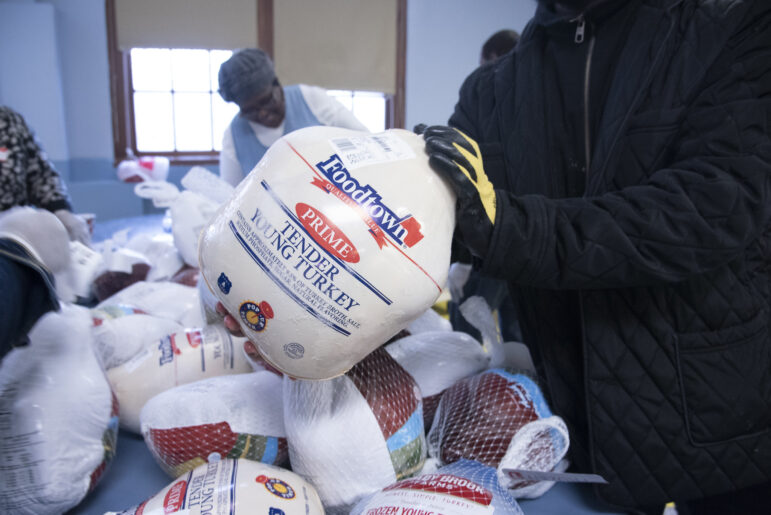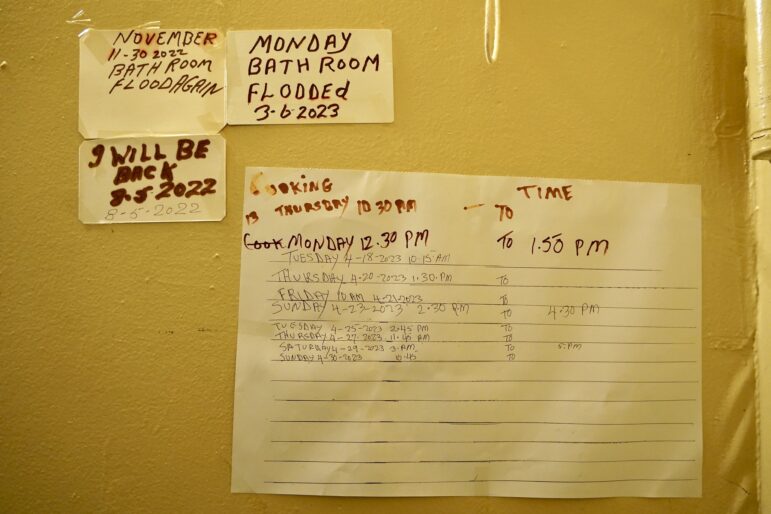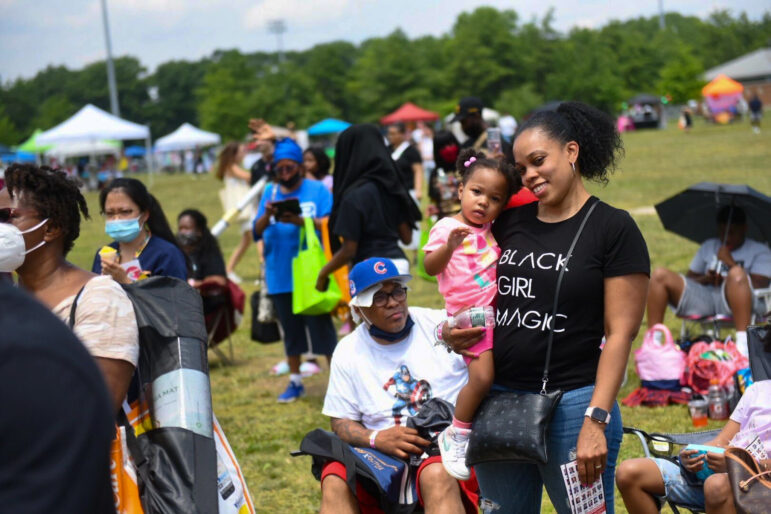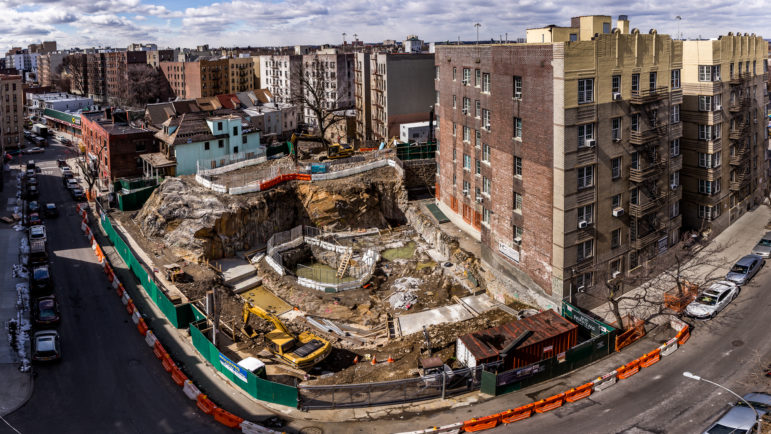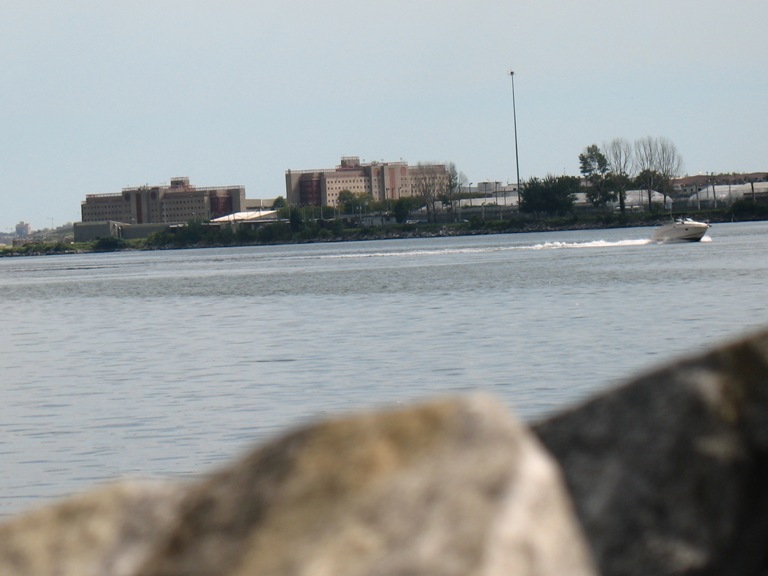
Jarrett Murphy
The Rikers Island jail complex. As of Tuesday, there were 5,424 people incarcerated in city jails, according to public data.A Brooklyn Councilmember believes the de Blasio administration is moving towards a policy of temporarily releasing medically vulnerable inmates from city jails, as a growing chorus demanded the city pull back on low-level enforcement during the Coronavirus crisis.
“There is some movement, some discussion of how they operationalize some releases,” Brad Lander said during a virtual press conference on Wednesday afternoon with Public Advocate Jumaane Williams and leaders of a key criminal-justice reform coalition.
The death of a Department of Corrections official from Coronavirus over the weekend elevated worries about how the highly communicable disease could threaten the city’s incarcerated population. According to a daily listing of incarcerated people available via NYC OpenData, there were 5,424 people held by the city on Tuesday.
On Wednesday, Lander and Williams called for the city to stop making arrests for “broken windows” or quality of life crimes, and instead to issue summonses or Desk Appearance Tickets.
“It makes no sense that we are trying to put more people in the system for these crimes,” Williams said. “We need less people in it.” Williams also called for a suspension of detention for people accused of technical parole violations. “Let’s not tell people to shelter in their homes and then go get them for a technical violation.
Joining Lander and Williams at the press conference were members of Communities United for Police Reform, who issued an even stronger call for no enforcement of any kind on low-level, quality of life offenses. Even a summons was problematic, says Kesi Foster of Make the Road New York, because it imposes an “indefinite IOU” on low-income New Yorkers facing “tremendous financial strain” as a result of the economic impact of the virus, and creates a potential backlog in courts once business resumes.
On Monday, the Legal Aid Society called for an unprecedented moratorium on all arrests. In a move just as unprecedented, the city’s Board of Correction on Tuesday called on the city to “immediately remove from jail all people at higher risk from COVID-19 infection” and “rapidly decrease the jail population.”
“While Department of Correction (DOC) and Correctional Health Services (CHS) staff continue to perform heroic work to prevent the transmission of COVID-19 in the jails and maintain safe and humane operations, the city must drastically reduce the number of people in jail right now and limit new admissions to exceptional circumstances,” the Board said.
Moments after Lander’s and Williams’ press conference, Council Speaker Corey Johnson and Queens Councilmember Rory Lancman, head of the committee on the criminal justice system, called for the NYPD to halt low-level arrests.
The advocates and officials also called for the NYPD to stop executing bench warrants, which are issued for failure to appear in court.
On Tuesday, Mayor de Blasio said that people who are arrested and display flu-like symptoms “will not be taken to a precinct, will not be taken to central booking” but that a video conference system would be used to process their arrest. As for those in jail, he said officials were evaluating “the number of people in our jail system who might be particularly high-risk in terms of vulnerability to the virus and another category of people – those who are incarcerated but are at low-risk of re-offending.”
“We’re going to evaluate those numbers and the details and determine if case-by-case any of those individuals should be taken out of our jail system,” he said.
A number of decision makers could be involved in any effort to depopulate city jails. The state Department of Correction and Community Supervision would have say over parole violation arrests and detentions. District attorneys could go before judges to set new bail levels or rescind bail for people held on that basis. The governor could order the release of people who’ve been sentenced to serve short sentences in city jail. Federal action would be required to release the many people being held on federal remand.
Some 900 people in city jails are older than 50 and 600 of them have chronic medical conditions. Of that older population, 300 are on parole warrants, 350 are remanded on federal warrants, 200 are on bail and 75 are serving city sentences.
The city also hosts two federal lockups where fears about Coronavirus are also high. Federal judges and prosecutors must halt all activity not related to addressing an imminent threat of violence, Lander said.
Lander also called for people who remain in city jails to have “regular and unimpeded access to teleconferencing and phone calls” so they can talk to loved ones. “There is a lot of fear on both sides,” he said.
Advocates pointed to the need to increase capacity in the homeless shelter system, since many released inmates and detainees could end up there.
Some expressed hope that the crisis would create mass support for deeper societal changes, starting with the pending state and city budgets. “What we have here is an opportunity to fund a future that is more positive than what we have now,” said Anthonine Pierre of the Brooklyn Movement Center.
But there was also concern that the response to the crisis could exacerbate inequalities. “We have to make sure the Constitutional and civil rights of people in our communities continue to be upheld during this crisis,” Foster said.
Later Wednesday, the Department of Corrections confirmed that both a corrections officer and a pre-trial detainee had tested positive for COVID-19. The agency said it had removed the inmate from general population and was working to identify people who’d come in contact with the patient.
“A uniformed member of our department has tested positive for COVID-19 and is now under the care of a medical professional. The officer is assigned to a post that does not routinely include contact with people in custody and will not return to work until medically cleared per DOHMH guidance,” Deputy Commissioner for Public Information, Peter Thorne said in a statement. “Individuals who had close contact with this employee are being identified and advised to self-quarantine for 14 days. As always, the health and well-being of our personnel, people in custody, and our community, remains our top priority.”


